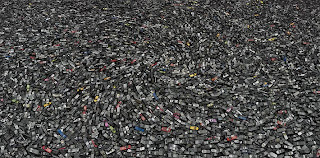
www.chrisjordan.com/images/current/1121878289.jpg
I’d like you to consider this prompt in light of our conversation Tuesday about the similarities and differences between Leopold “sketches” and Trumpey’s lectures. Remember that there were as many overlaps of core concepts and attitudes as there were distinctions.
In lecture we have been talking about the “production based and consumer oriented” nature of our global society.* Find a quote from Sand County that illustrates Leopold’s opinion on this topic. The text is FULL of his observations infused with either implicit or explicit commentary on consumerism (see examples below). Summarize the context of the quote, explain Leopold’s main points and tone. Reflect on your individual experience in our production-based/ consumerist society. Give an example from your personal experience/ observations that relates to the quote you chose.
Things to think about: There are many ways you could approach this depending on which quote you choose. Think about his discussion of the paradox of conservation (100-101) or how not “thinking like a mountain” actually leads to poorer situation for the consumer (129-133).
Examples:
• “The high priests of progress knew nothing of cranes, and cared less. What good is a species more or less among engineers? What good is an undrained marsh anyhow?” (100)
• “To build a road is so much simpler than to think of what the country really needs” (101)
• “…but if I were (an economist) I should do all my pondering lying prone on the sand, with Draba at nose length” (103)
• “everything on this farm spells money in the bank…even the pigs look solvent” (119)
• “…Thoreau’s dictum: In wildness is the salvation of the world” (133)
Last thing: No more slacking on citing your sources in the other WRs!!! (I know most of you have been doing this, so disregard). This was a clear requirement of all written work in this class (it’s for your own good- trust me☺) and I have to take off points when you don’t list your citations.
*(note: this is no longer just a critique of “Americans” or “American society” but a pervasive global trend).
Leopold, Aldo. Sand County Almanac, and Sketches Here and There. New York: Oxford UP, 1949.
Trumpey, Joseph. Art Design Perspective 3: Technology and the Environment. Stamps Auditorium, Ann Arbor, MI. 5 and 7 Oct 2009. Lecture.